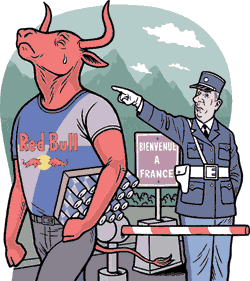No one’s quite sure what will happen when the sale of foie gras becomes illegal in August under the strictures of the city council’s ban. While animal-rights activists rejoice, the local restaurant industry ponders the ban’s possibilities. Will a Mob-controlled black market emerge? Foie speakeasies? BYOF nights? In search of clues, The Closer looks back at prohibitions past.
 |
RED BULL
(France, 2000 to present)
Argument for prohibition: The French government has prohibited the sale of the highly caffeinated Austrian energy drink in accordance with concerns that stipulate a maximum caffeine content in food products. Additionally, a damning French study showed that rats fed taurine (a chemical composition found in Red Bull) practiced self-mutilation. Argument against: “No authority in the world has ever discovered or proven an unhealthy effect in or from Red Bull Energy Drink,” says Patrice Radden of Red Bull Communications. What happened? In 2004, the European Court of Justice upheld the ban. The French collectively shrugged and went back to consuming fine French roast coffee. Unintended byproduct: A successful energy drink in France is another Austria-based beverage called Dark Dog. Did prohibition work? For now-but Red Bull will continue to work toward breaking into France. “Red Bull has not been banned in any country,” Radden says. “There are places where it has not been authorized yet.”
 |
ALCOHOL
(United States, 1920-33)
Argument for prohibition: Alarmed at America’s level of intoxication and crime, Congress passed the 18th Amendment in the hope that banning alcohol would lead to a healthier, safer, and more productive nation. Argument against: See Capone, Al. What happened? Gangsters took control of the alcohol trade, which became impossible to regulate due to bribery, murder, and political corruption. The public was easily able to procure booze-from speakeasies, bootleggers, doctors, and Canada. Unintended byproducts: Impure alcohol blinded, paralyzed, or killed thousands of people; the use of marijuana, cocaine, coffee, and ether skyrocketed. Did prohibition work? Initially, alcohol consumption and crime rates dropped, but soon, prisons were overcrowded and alcohol consumption had risen to new levels. Both plummeted once Prohibition was repealed in 1933.
 |
OPIUM
(Afghanistan, 2000-2001)
Argument for prohibition: The Taliban decreed the poppy-derived narcotic to be “against Islam.” Argument against: The brutality of the Taliban’s anti-drug interdictions could sometimes include violent punishment of offenders. What happened? September 11th. After the U.S. overthrew the Taliban, opium cultivation resumed in full. Today, Afghanistan’s opium production-which accounts for 75 percent of the world’s total product-is back to record levels. Unintended byproduct: Some poppy farmers, suddenly destitute, resorted to selling their daughters. Did prohibition work? “In drug control terms it was an unprecedented success,” said Sandeep Chawla, head of the United Nations Office on Drugs and Crime, in a report. “But in humanitarian terms [it was] a major disaster.”
 |
CIGARETTES
(Washington State, 1907-11)
Argument for prohibition: Progressive Era reformers found smoking to be a hazardous, addictive practice that could lead to the use of other drugs. Argument against: An 1893 New York Times editorial said: “The smoking of cigarettes may be objectionable, as are many other foolish practices . . . but it is an evil which cannot be remedied by law.” What happened? Uninterested Washington police arrested only about 60 smokers during the first month of the ban, nabbed six more during the next three months, and none after that. Unintended byproduct: Before introducing his anti-cigarette bill, Sen. Orville A. Tucker caught a curtain on fire in an Olympia, Washington, hotel room while trying to light a cigar. Did prohibition work? No.
Illustration: Danny Hellman


